So, you’ve heard of the word probiotic before, and you know they’re good for you. But what exactly are probiotics, and does probiotic tea really work? If so, what does it work for? Read on to find out! 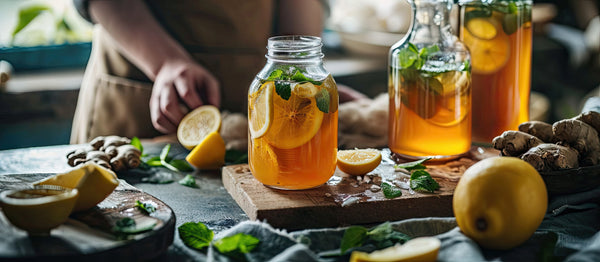
What are probiotics?
Probiotics are a type of living microorganisms (also known as microbes) that can often be found in fermented foods like yogurt, pickles, and miso soup. Microorganisms are teeny tiny viruses, bacteria, and fungi that are so small they can only be seen under a microscope. While it’s true that some microorganisms can be harmful and cause sickness, there’s a whole host of microbes living in our bodies right now that we rely on to keep us healthy. The microorganisms that we live with every day - over 10,000 species of them - help us digest food, protect against infection, and even positively affect men’s reproductive health and women’s reproductive health. The specific microbes that are called probiotics are specialists in digestion and gut health. 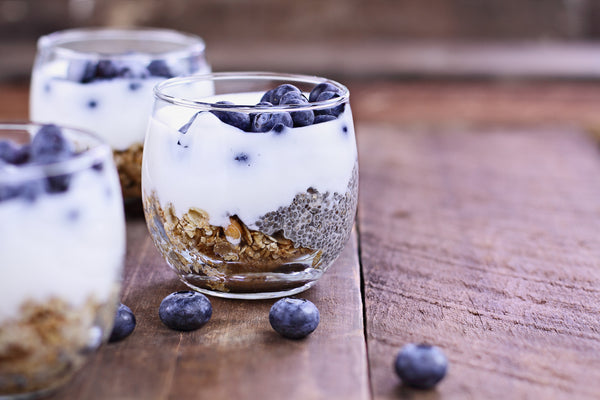 Helping our bodies destroy bad microbes is an important part of maintaining our health, but studies show that supporting good microbes maybe even more important than destroying the bad ones. The more good probiotics are present, the less room there is in our bodies for bad microbes.
Helping our bodies destroy bad microbes is an important part of maintaining our health, but studies show that supporting good microbes maybe even more important than destroying the bad ones. The more good probiotics are present, the less room there is in our bodies for bad microbes.
What do probiotics do?
Organs like the mouth, stomach, intestines, and anus, when grouped together, are commonly called our “gut.” Probiotics are gut health specialists that affect how well we use and store energy from food, and they play a really important role in how we absorb calories. Probiotics also have a big effect on how sensitive our stomachs and skin are and our overall brain health.
Probiotics can help our bodies maintain homeostasis (healthy balance) of good and bad microbes, improve our immune response, strengthen our gut and skin health, and reduce inflammation.
What’s a prebiotic?
While probiotics are the actual living microbes that go to work inside of our bodies, prebiotics are types of foods that we can consume to help support and nurture the probiotics we have.
Prebiotic foods are often high in fiber, such as whole grains, bananas, and greens. Consuming both prebiotics and probiotics together is a great way to ensure that your body has what it needs for great gut health.
What should I use probiotics for?
Studies are actively being done to better understand the link between gut health and overall health. Probiotics are known for fighting chronic bacterial infections, Chrone’s disease, inflammation and immune response, inflammation of the skin, diarrhea, improving metabolism, allergies, obesity, cardiovascular health, mental health, frequency and quality of bowel movements, and more.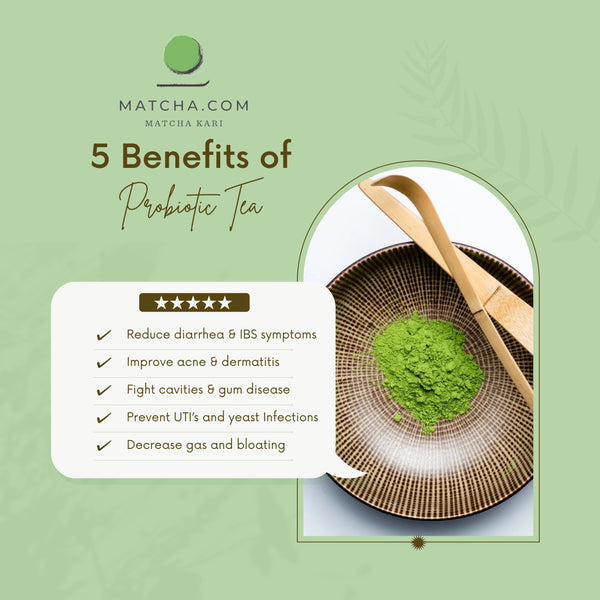
What is probiotic tea, and why should I drink it?
There are lots of foods that we can eat, and supplements we can take that contain probiotics. There are also certain types of teas that we can drink with probiotics, too! Drinking probiotic tea combines the health benefits of probiotics with the health benefits of tea to create a smorgasbord of microbes, vitamins, and antioxidants that promote well-being.
There are two different sources of probiotic tea:
1. Probiotics added to tea bags
This type of probiotic tea is pretty straightforward. Strains of probiotics that are heat resistant are added to tea bags. The type of probiotics often found in tea bags is the same type that you can get from taking probiotic capsules. Ginger probiotic tea is a common type of tea with probiotics added to it. Ginger can help calm the stomach and fight nausea, and combining it with added probiotics is a great way to improve your gut health.
2. Teas that naturally contain probiotics 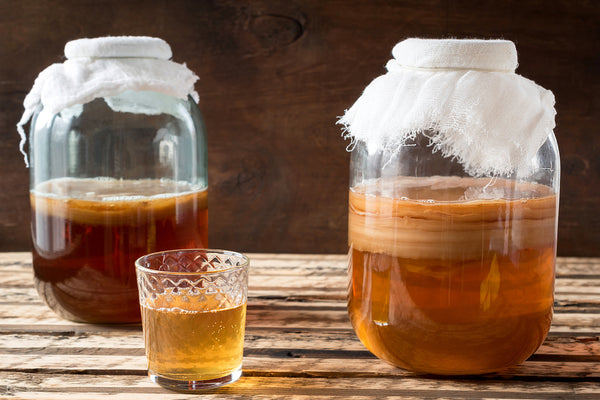
Because probiotics are living microorganisms, there are a few very select types of teas that naturally contain them. Kombucha, pu’er, and matcha green tea all have probiotics in them naturally and don’t need supplemental probiotics added.
Matcha green tea is particularly special because it’s a synbiotic—that means it contains both pre- and probiotics!
Sure, we may be a little biased, but the high concentrations of antioxidants mixed with the experience of getting caffeine without the jitters and crash (thanks to l-theanine) plus the prebiotics and probiotics in matcha make drinking matcha as a source of probiotics a no brainer! 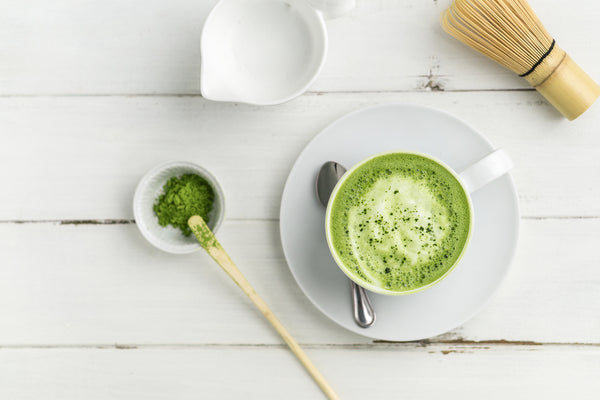
Bottom line
Probiotics are amazing for improving gut and skin health and promoting overall well-being. They help us fight diseases, metabolize sugars and fats in our food, improve acne, and so much more. To get probiotics, you can take a probiotic supplement as a vitamin, eat foods that naturally contain probiotics, or try probiotic teas like kombucha, matcha green tea, and teas with probiotics added to the tea bag.
Disclaimer: These statements in this blog post have not been evaluated by the Food and Drug Administration. The information provided here is for educational purposes only and should not be considered medical advice. It's essential to consult with a qualified healthcare professional before making any dietary or lifestyle changes.
Resources:
InformedHealth.org [Internet]. Cologne, Germany: Institute for Quality and Efficiency in Health Care (IQWiG); 2006-. What are microbes? 2010 Oct 6 [Updated 2019 Aug 29]. Available from: https://www.ncbi.nlm.nih.gov/books/NBK279387/
Bond, T., & Derbyshire, E. (2019). Tea Compounds and the Gut Microbiome: Findings from Trials and Mechanistic Studies. Nutrients, 11(10), 2364. https://doi.org/10.3390/nu11102364
Tewari, S., Dubey, K. K., & Singhal, R. S. (2018). Evaluation and application of prebiotic and probiotic ingredients for development of ready to drink tea beverage. Journal of food science and technology, 55(4), 1525–1534. https://doi.org/10.1007/s13197-018-3070-9
Selvaraj, S., & Gurumurthy, K. (2022). An overview of probiotic health booster-kombucha tea. Chinese herbal medicines, 15(1), 27–32. https://doi.org/10.1016/j.chmed.2022.06.010
Zeratsky, K. (2022b, July 2). Probiotics and Prebiotics: What you should know. Mayo Clinic. https://www.mayoclinic.org/healthy-lifestyle/nutrition-and-healthy-eating/expert-answers/probiotics/faq-20058065#:~:text=Probiotics%20are%20foods%20or%20supplements,as%20food%20for%20human%20microflora.
Professional, C. C. medical. (n.d.). What are probiotics & what do they do?. Cleveland Clinic. https://my.clevelandclinic.org/health/treatments/14598-probiotics
U.S. Department of Health and Human Services. (n.d.-b). Probiotics: What you need to know. National Center for Complementary and Integrative Health. https://www.nccih.nih.gov/health/probiotics-what-you-need-to-know
U.S. Department of Health and Human Services. (2018, January 10). Your microbes and you. National Institutes of Health. https://newsinhealth.nih.gov/2012/11/your-microbes-you#:~:text=Microscopic%20creatures%E2%80%94including%20bacteria%2C%20fungi,even%20maintain%20your%20reproductive%20health.







